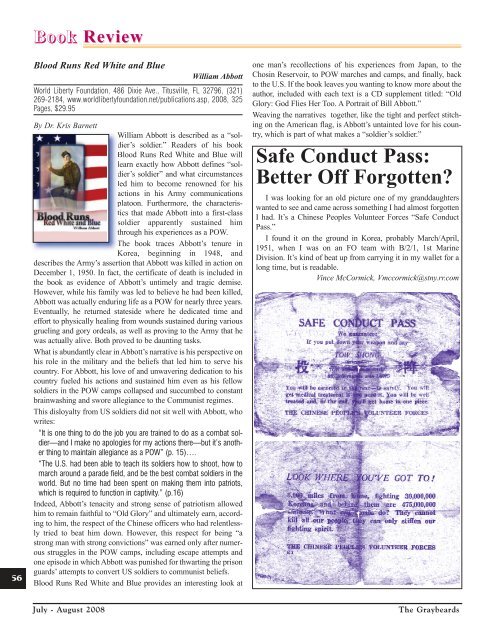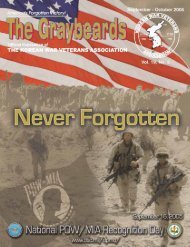Jul/Aug 2008 - Korean War Veterans Association
Jul/Aug 2008 - Korean War Veterans Association
Jul/Aug 2008 - Korean War Veterans Association
Create successful ePaper yourself
Turn your PDF publications into a flip-book with our unique Google optimized e-Paper software.
56<br />
Book Review<br />
Blood Runs Red White and Blue<br />
William Abbott<br />
World Liberty Foundation, 486 Dixie Ave., Titusville, FL 32796, (321)<br />
269-2184, www.worldlibertyfoundation.net/publications.asp, <strong>2008</strong>, 325<br />
Pages, $29.95<br />
By Dr. Kris Barnett<br />
William Abbott is described as a “soldier’s<br />
soldier.” Readers of his book<br />
Blood Runs Red White and Blue will<br />
learn exactly how Abbott defines “soldier’s<br />
soldier” and what circumstances<br />
led him to become renowned for his<br />
actions in his Army communications<br />
platoon. Furthermore, the characteristics<br />
that made Abbott into a first-class<br />
soldier apparently sustained him<br />
through his experiences as a POW.<br />
The book traces Abbott’s tenure in<br />
Korea, beginning in 1948, and<br />
describes the Army’s assertion that Abbott was killed in action on<br />
December 1, 1950. In fact, the certificate of death is included in<br />
the book as evidence of Abbott’s untimely and tragic demise.<br />
However, while his family was led to believe he had been killed,<br />
Abbott was actually enduring life as a POW for nearly three years.<br />
Eventually, he returned stateside where he dedicated time and<br />
effort to physically healing from wounds sustained during various<br />
grueling and gory ordeals, as well as proving to the Army that he<br />
was actually alive. Both proved to be daunting tasks.<br />
What is abundantly clear in Abbott’s narrative is his perspective on<br />
his role in the military and the beliefs that led him to serve his<br />
country. For Abbott, his love of and unwavering dedication to his<br />
country fueled his actions and sustained him even as his fellow<br />
soldiers in the POW camps collapsed and succumbed to constant<br />
brainwashing and swore allegiance to the Communist regimes.<br />
This disloyalty from US soldiers did not sit well with Abbott, who<br />
writes:<br />
“It is one thing to do the job you are trained to do as a combat soldier—and<br />
I make no apologies for my actions there—but it’s another<br />
thing to maintain allegiance as a POW” (p. 15)….<br />
“The U.S. had been able to teach its soldiers how to shoot, how to<br />
march around a parade field, and be the best combat soldiers in the<br />
world. But no time had been spent on making them into patriots,<br />
which is required to function in captivity.” (p.16)<br />
Indeed, Abbott’s tenacity and strong sense of patriotism allowed<br />
him to remain faithful to “Old Glory” and ultimately earn, according<br />
to him, the respect of the Chinese officers who had relentlessly<br />
tried to beat him down. However, this respect for being “a<br />
strong man with strong convictions” was earned only after numerous<br />
struggles in the POW camps, including escape attempts and<br />
one episode in which Abbott was punished for thwarting the prison<br />
guards’ attempts to convert US soldiers to communist beliefs.<br />
Blood Runs Red White and Blue provides an interesting look at<br />
one man’s recollections of his experiences from Japan, to the<br />
Chosin Reservoir, to POW marches and camps, and finally, back<br />
to the U.S. If the book leaves you wanting to know more about the<br />
author, included with each text is a CD supplement titled: “Old<br />
Glory: God Flies Her Too. A Portrait of Bill Abbott.”<br />
Weaving the narratives together, like the tight and perfect stitching<br />
on the American flag, is Abbott’s untainted love for his country,<br />
which is part of what makes a “soldier’s soldier.”<br />
Safe Conduct Pass:<br />
Better Off Forgotten?<br />
I was looking for an old picture one of my granddaughters<br />
wanted to see and came across something I had almost forgotten<br />
I had. It’s a Chinese Peoples Volunteer Forces “Safe Conduct<br />
Pass.”<br />
I found it on the ground in Korea, probably March/April,<br />
1951, when I was on an FO team with B/2/1, 1st Marine<br />
Division. It’s kind of beat up from carrying it in my wallet for a<br />
long time, but is readable.<br />
Vince McCormick, Vmccormick@stny.rr.com<br />
<strong>Jul</strong>y - <strong>Aug</strong>ust <strong>2008</strong><br />
The Graybeards

















